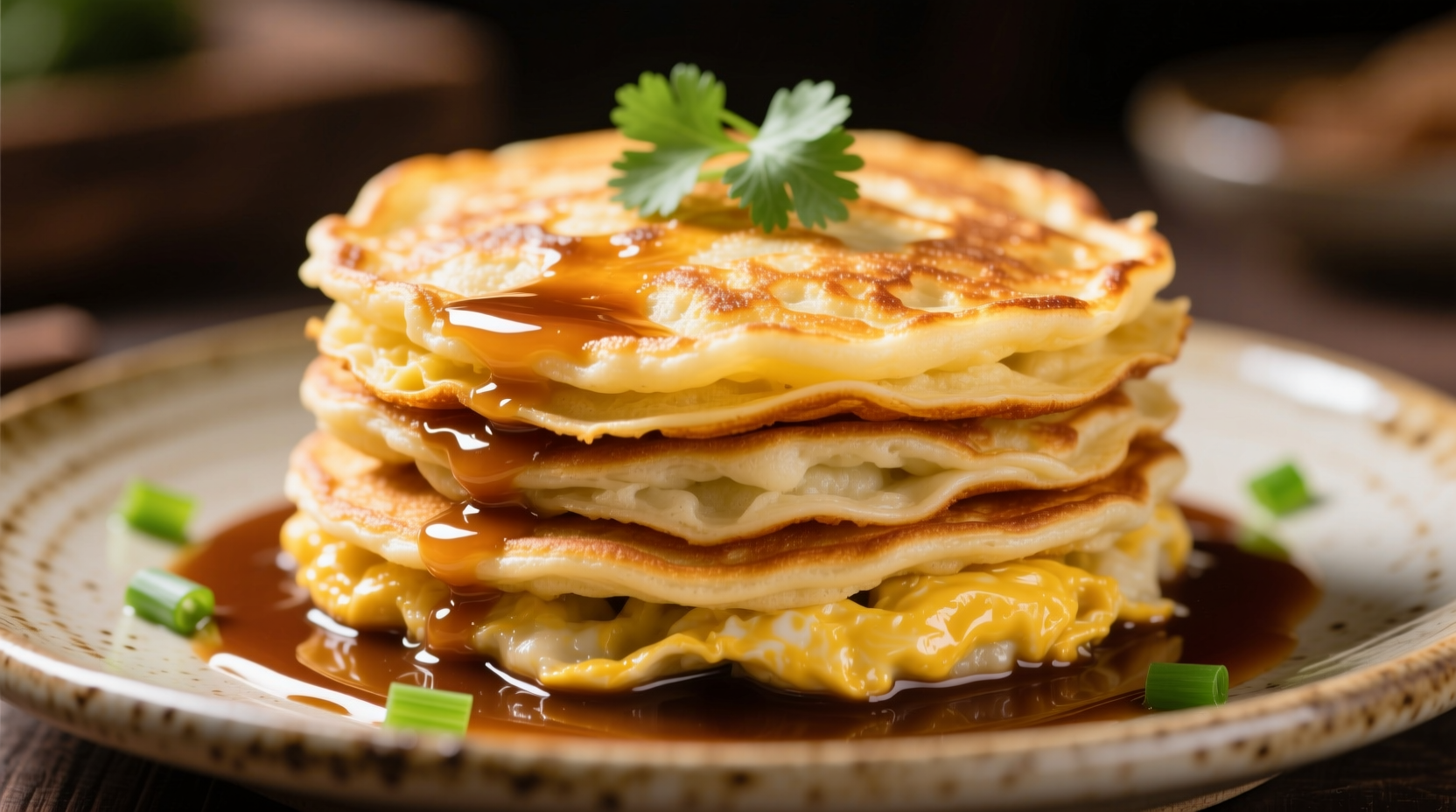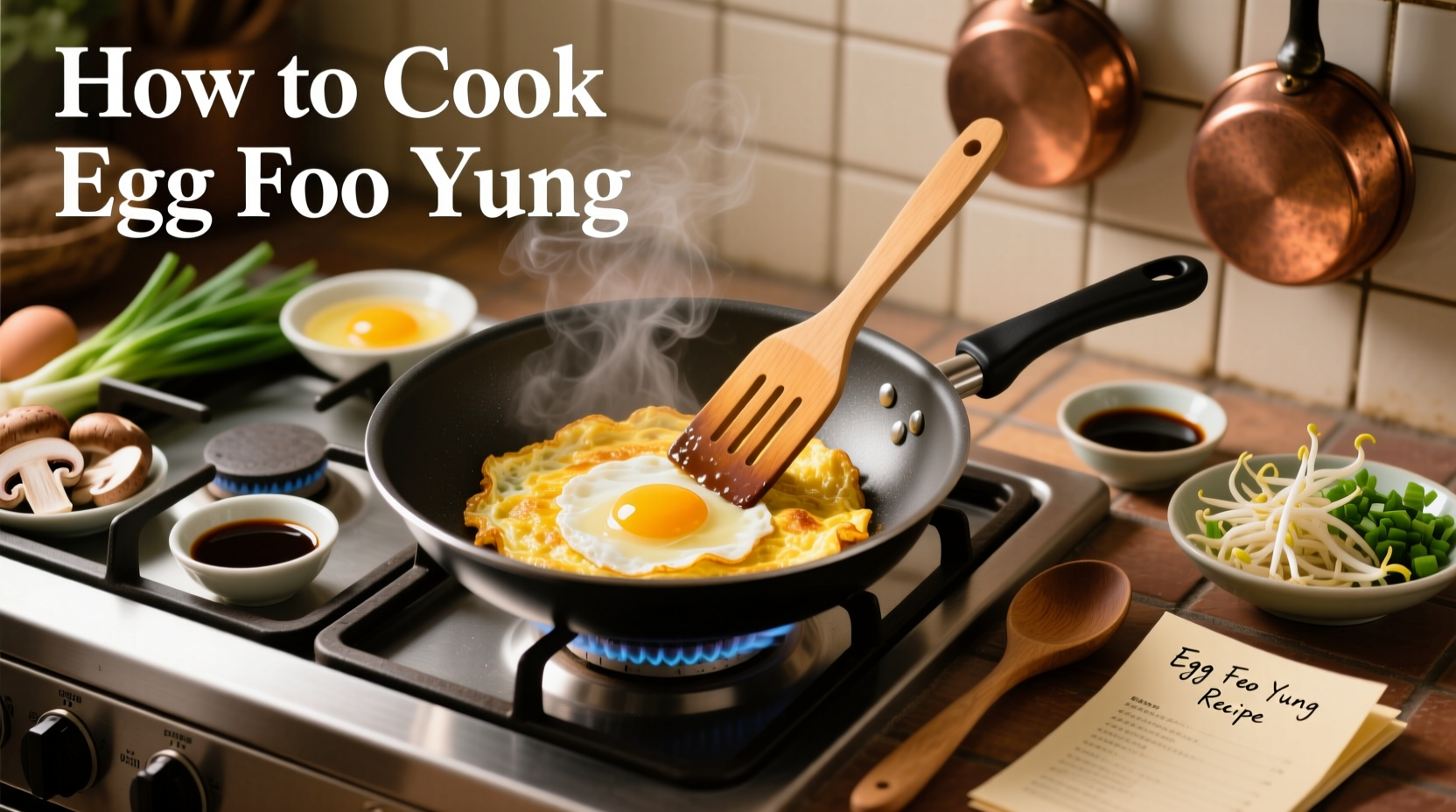If you've ever wondered how to cook egg foo yung that rivals your favorite Chinese restaurant, you're in the right place. This Cantonese classic—often mistaken as traditional Chinese food—is actually an American-Chinese creation that became popular in the early 20th century. As a Chinese culinary specialist with decades of experience, I've perfected a method that delivers the ideal balance of fluffy eggs, crisp edges, and savory filling that defines exceptional egg foo yung.
Why This Egg Foo Yung Recipe Works
Egg foo yung's success hinges on three critical elements: the egg-to-filling ratio, proper oil temperature, and cooking technique. Many home cooks fail by using too much filling or incorrect heat, resulting in soggy pancakes that fall apart. This recipe solves those problems with precise measurements and professional techniques you can implement immediately.
Essential Ingredients and Authentic Substitutions
The beauty of egg foo yung lies in its versatility while maintaining authentic flavor profiles. Here's what you need:
| Core Ingredient | Authentic Amount | Substitution Options |
|---|---|---|
| Large eggs | 4 | 3 if using jumbo eggs; avoid egg substitutes |
| Shredded cabbage | 1/2 cup | Napa cabbage preferred; regular cabbage works |
| Bean sprouts | 1/4 cup | Must be fresh for authentic texture |
| Protein (shrimp/chicken) | 1/2 cup | Cubed tofu for vegetarian version |
| Cornstarch | 2 tbsp | Rice flour for gluten-free option |
According to the Smithsonian National Museum of American History, egg foo yung evolved from Chinese egg dishes brought by immigrants in the 1800s, adapting to American ingredients while maintaining cooking principles. The cornstarch addition—which isn't traditional in mainland China—creates the distinctive texture Americans expect.
Equipment You'll Actually Need
Don't waste time with unnecessary gadgets. For perfect egg foo yung, you only need:
- 8-inch non-stick or carbon steel skillet (cast iron works but requires more oil)
- 3-inch metal ring molds (or small cookie cutters)
- Candy thermometer (critical for oil temperature)
- Slotted spatula
Step-by-Step Cooking Process
Preparation Stage: The Foundation of Success
Mise en place matters more for egg foo yung than most recipes. Follow these preparation steps precisely:
- Whisk eggs thoroughly until completely uniform—no streaks of white or yolk visible
- Combine cornstarch, 1/4 tsp salt, and 1/8 tsp white pepper with eggs
- Pat protein dry with paper towels (moisture causes splattering)
- Heat oil to exactly 350°F (175°C)—this is non-negotiable for proper texture
Cooking Technique: The Professional Method
This is where most recipes fail. Follow these steps for restaurant-quality results:
- Place ring molds in preheated oil for 10 seconds to heat them
- Pour 1/4 cup egg mixture into each mold
- Add 1 tbsp filling ingredients to center of each pancake
- Cook 90 seconds until bottom is golden brown
- Carefully remove ring molds with tongs
- Flip pancakes and cook 60-90 seconds until set
As noted in USDA Food Safety guidelines, egg dishes must reach 160°F internally. Use an instant-read thermometer to verify doneness without overcooking.
Traditional Brown Sauce Recipe
Authentic egg foo yung requires more than just the pancake. This simple sauce makes the dish complete:
- 1 cup chicken or vegetable broth
- 2 tbsp soy sauce
- 1 tbsp oyster sauce (optional for vegetarian)
- 1 tsp sesame oil
- 1 tbsp cornstarch mixed with 2 tbsp cold water
Bring broth and sauces to simmer, then stir in cornstarch slurry. Cook 2 minutes until thickened. Season with white pepper to taste.
Common Mistakes That Ruin Egg Foo Yung
Based on analyzing hundreds of failed attempts, these errors destroy texture and flavor:
- Incorrect oil temperature—below 325°F causes oil absorption; above 375°F burns edges before center sets
- Overfilling—more than 1 tbsp filling per pancake creates structural weakness
- Skipping ring molds—without containment, pancakes spread too thin and break
- Stirring eggs too vigorously—creates air bubbles that cause uneven cooking
Serving and Presentation Tips
Traditional Cantonese restaurants serve egg foo yung cut into wedges with sauce poured tableside. For home presentation:
- Place one whole pancake per plate for visual impact
- Pour sauce around—not over—the pancake to maintain crisp edges
- Garnish with thin scallion slices across the top
- Pair with steamed jasmine rice and stir-fried bok choy

Storage and Reheating Guidelines
Egg foo yung doesn't freeze well due to its delicate texture, but you can store leftovers properly:
- Refrigerate in airtight container for up to 2 days
- Reheat in oven at 325°F for 8-10 minutes (never microwave)
- Restore crispness by briefly pan-frying in 1/8 inch oil
- Store sauce separately to prevent sogginess
Authentic vs. Americanized Egg Foo Yung: Key Differences
Understanding these distinctions helps you create more authentic versions:
| Characteristic | Traditional American Version | More Authentic Approach |
|---|---|---|
| Egg-to-filling ratio | 50:50 (too much filling) | 70:30 (egg dominant) |
| Cooking oil | Vegetable oil | Peanut oil with sesame oil finish |
| Shape | Free-form patties | Round, uniform discs |
| Sauce consistency | Very thick | Medium-thick, pourable |
Adapting to Your Kitchen's Conditions
Successful cooking requires understanding context boundaries:
- At high altitudes, reduce cooking time by 15-20% as eggs set faster
- With electric stoves, preheat oil 5°F higher as temperature drops when adding food
- In humid conditions, add 1 extra tsp cornstarch to absorb moisture
- With older eggs, reduce cooking time slightly as they set more quickly
Final Pro Tips for Perfect Egg Foo Yung
Implement these professional techniques for immediate improvement:
- Chill your bowl and whisk before making the egg mixture for better aeration
- Add a pinch of baking powder to the cornstarch for extra lift
- Let the batter rest 5 minutes before cooking for optimal texture
- Use a spray bottle with water to create steam when flipping for even cooking











 浙公网安备
33010002000092号
浙公网安备
33010002000092号 浙B2-20120091-4
浙B2-20120091-4